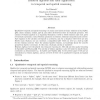Free Online Productivity Tools
i2Speak
i2Symbol
i2OCR
iTex2Img
iWeb2Print
iWeb2Shot
i2Type
iPdf2Split
iPdf2Merge
i2Bopomofo
i2Arabic
i2Style
i2Image
i2PDF
iLatex2Rtf
Sci2ools
AIR
2005
2005
Relation Algebras and their Application in Temporal and Spatial Reasoning
Qualitative temporal and spatial reasoning is in many cases based on binary relations such as before, after, starts, contains, contact, part of, and others derived from these by relational operators. The calculus of relation algebras is an equational formalism; it tells us which relations must exist, given several basic operations, such as Boolean operations on relations, relational composition and converse. Each equation in the calculus corresponds to a theorem, and, for a situation where there are only nitely many relations, one can construct a composition table which can serve as a look up table for the relations involved. Since the calculus handles relations, no knowledge about the concrete geometrical objects is necessary. In this sense, relational calculus is pointless. Relation algebras were introduced into temporal reasoning by Allen [1] and into spatial reasoning by Egenhofer and Sharma [32]. The calculus of relation algebras is also well suited to handle binary constraints a...
| Added | 15 Dec 2010 |
| Updated | 15 Dec 2010 |
| Type | Journal |
| Year | 2005 |
| Where | AIR |
| Authors | Ivo Düntsch |
Comments (0)

